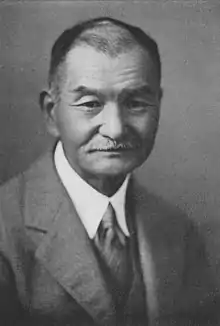Matatarō Matsumoto
Matatarō Matsumoto (松本 亦太郎, Matsumoto Matatarō, 1865–1943) was a Japanese psychologist who set up the first psychological laboratory in Japan and founded the Japanese Psychological Association. He has been described as "the most eminent figure in the history of psychology in Japan."[1]
Matatarō Matsumoto | |
|---|---|
 | |
| Born | November 3, 1865 |
| Died | December 24, 1943 (aged 78) |
| Scientific career | |
| Fields | Experimental psychology |
| Influences | Yūjirō Motora Edward Wheeler Scripture Wilhelm Wundt |
Career
Matsumoto earned a bachelor's degree and a master's degree at Tokyo Imperial University under Yūjirō Motora, the man who had introduced scientific psychology to Japan.[2] He then completed a Ph.D. at Yale University under experimental psychologist Edward Wheeler Scripture, and the school made him an assistant professor. Shortly thereafter, however, the government of Japan decided to send him to Europe. For about three years, Matsumoto did postdoctoral study with Wilhelm Wundt and other psychologists, returning in 1900.[3]
Matsumoto took a faculty position at the Tokyo Higher Normal School upon returning to Japan. He also consulted with Motora as the latter built the first psychology laboratory in Japan in 1903. (While he was studying in Europe, Motora had asked him to purchase certain supplies for the planned laboratory.) In 1906, Matsumoto went to Kyoto University and built Japan's second psychology laboratory.[4]
After Motora's death in 1912, Matsumoto came back to Tokyo Imperial University and assumed Motora's position as the department chair there.[4]
Matsumoto was also the founding president of the Japanese Psychological Association and president of the Kyoto Prefectural School of Art and Crafts, later known as the Kyoto City University of Arts. He was elected to the Japan Academy in 1921.[5]
References
- Okamoto, S. (1976). "Dr. Matataro Matsumoto: His career and achievements". Journal of the History of the Behavioral Sciences. 12 (1): 31–38. doi:10.1002/1520-6696(197601)12:1<31::aid-jhbs2300120104>3.0.co;2-j. PMID 801142.
- Arakawa, Ayumu (May 1, 2005). "Psychology of feelings and emotions: Its history in Japan". Japanese Psychological Research. 47 (2): 106–114. doi:10.1111/j.1468-5884.2005.00278.x. ISSN 1468-5884.
- Sato, Tatsuya; Sato, Takao (2005). "The early 20th century: Shaping the discipline of psychology in Japan1". Japanese Psychological Research. 47 (2): 52–62. doi:10.1111/j.1468-5884.2005.00273.x. ISSN 1468-5884.
- Sato, Tadasu Oyama Tatsuya; Suzuki, Yuko (2001). "Shaping of scientific psychology in Japan". International Journal of Psychology. 36 (6): 396–406. doi:10.1080/00207590143000225. ISSN 0020-7594.
- "Deceased Members: L,M | The Japan Academy". www.japan-acad.go.jp. Retrieved August 23, 2020.